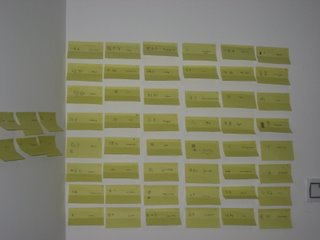Have you ever blown through a test with 100% confidence? I mean really breezed though it, glided through with your pen barely leaving the test paper throughout the entire process, experienced non-stop scribbling because none of the questions present you with the *stop and scratch your head* impulse, no "hmm?" leaves your lips, your feet don't tap the ground, and your eyes don't roll around in your head - do you know what I'm talking about? I recently ACED a couple of exams. *Grin*
Since I have not formally studied anything since High school, getting back into the groove(not that there was much of a groove to begin with) of formal instruction has been interesting. Since arriving to China I've done a lot of reading on how the brain works, how humans acquire languages, why certain memory techniques work and why some don't. Through my curiosity I've come across a lot of interesting research, different studies, facts, and statistics. A lot of what I came across made perfect sense and a lot was from Mars. I've had the enlightening opportunity to incorporate bits and pieces of things that really stuck a cord with me, and implement them into my own study routine.
A lot of what I find myself constituting as 'studying Chinese' is me learning Hanzi(Chinese characters). I can memorize the pinyin to English definition fairly easy, but if I put too much focus on only those two aspects then what happens later, when I want/need to learn the hanzi for that word is, I have to put myself through another memory association process of linking the Chinese meaning(also pronunciation) to the written character . It's like learning the same thing twice, in fact that's exactly what it is.
EXAMPLE:
The Learning Process: Eat--> chi1 fan4 --> 吃饭
Erik's brain went: English --> Chinese --> Chinese
I had to learn a Chinese equivalent for "eat" TWICE!
Also I had to link an association with another association! An associated association, I imagine, is a rather weak one. Although I don't know that for sure, my thinking is this: Remember that movie "Multiplicity" ? Well you can't clone a clone, the result is a flawed product, because the purity of the link is mucked up.
Some parts of a language are simply more complex than others.
I quickly realized that my original plan of dividing then spending equal amounts of study time on learning different aspects of the language, so as to prevent myself from excelling in one area and having a lackluster performance in another, was in fact having detrimental effects on my overall pace of achievement. Memorizing vocabulary isn't as highly a challenging task as is learning to write a character. So the question posed to myself, after awhile of rigidly dividing my study time was, why am I spending the same amount of study time on the 'easy' stuff as I am on the 'hard' stuff? Answer: Studying isn't a static concept, you have to be dynamic in your studies, you have to learn how to learn, learn how to approach and tackle a language. If I learn to study, I'll study to learn. Shortly after, my whole concept of, equally distributed amounts of study time equals being able to distribute equal performances in different areas, was officially moot. Language is so immensely and intricately intertwined that too much separation and divorcement of different aspects leaves you without the proper connections to make sense of what you're reading/hearing/writing, when going from one aspect to the other. I still think a balanced knowledge of the language is important, but I now understand that a balanced study time does not equate to a well-rounded knowledge base.
Lately I've been dedicating more study time on learning characters, the reason for this being, during tests my character recall(ability to produce the written form of any given word) often comes up blank, or gray at best. If on a test questions 1 - 20 asked me to give the English translation for the Chinese pinyin words, then 1 -20 would be completed without a problem. However if questions 1 - 20 had asked me to identify given characters and produce their pinyin or English equivalent, things would get messy (also applies to me having to produce the characters for given pinyin/English words.
(NOTE: Learning a Chinese character is a difficult thing, no matter how I switch the association process around. Its just accepted as fact that learning to associate a meaning with a complex pictograph or ideograph is no simple matter. My new approach simply tries to reduce the amount of time it will take to register all 3 together as one meaning. As well as increase exposure of the 3 as one unit.)
So how did I consolidate different materials to maximize my study time and employ different creative tactics, yet stick by my "a balanced knowledge of different aspects is important in language learning" approach?
Well I took into account a few things:
- My energy level at the end of the day
- People learn better and retain more when standing up or walking around
- Students remember 90% of what they do, 75% of what they see and 20% of what they hear.
- How do I employ tactics that will take advantages of what I've learned from my Uncle Michael on how learners learn.
- How do I go visual yet stay auditory and still do kinesthetic?
- My attempts at rote memorization were too slow and ineffective
If you were awaiting the unveiling of a never seen before study technique, I'm sorry to disappoint, my findings are quite simple yet practical in their applicability.
Customizing my study to fit my needs: Here's how I learn vocab - on a nicely-sized 'post-it' note. First I jot down the chapter # that the word comes from in the top right corner, secondly I write down the Chinese character on the left side, then on the right I put the English translation, on the back I write the pinyin with it's tone marks. Following the "factory stage", I stick the post-its to my wall in a series of rows and columns. I spend my time pacing around the room looking at the wall(1), I repeat the words out loud(2), I look to the character first and try and get the pinyin(3), I draw the characters with my finger in the air or on a small legal pad while I say the pinyin out loud(4 and reinforcement of 2).
- 1. Visual learning/Prevents me from getting tired or distracted/Helps my brain retain the information better.
- 3. Top down approach/Instead of going easy to hard(learning the English to pinyin, then the pinyin to character), I'm going hard to easy(learning recognition of a character)/Easy training hard combat, hard training easy combat.
This next part might come across as silly but I find it effective:I try and make up games by randomly pointing, in quick succession, to different post-its and saying the characters as fast as I can. If the word allows, I try my best to act out its meaning. I select different post-its and try and make up sentences, or even role play out both sides of a dialogue using the words. I pick a row or column at random and do it over and over again until I can go through the whole thing without a single mistake or askew character stroke.
Once I feel satisfied with the assimilation of a vocab (after some days or weeks), I peel it off the wall, and put another in it's place. Why do I put the chapter number on all the post-its? To give myself an evaluation tool, how long is it taking me to learn this word, why is a vocab from chapter 10 still stuck to this wall - when we're currently on chapter 18? Maybe I should go back to chapter 10 and review some material, are there any similarities in the word/character strokes?
LESS IS MORE
Sometimes "less really is more", the
less I focused on English to pinyin, and focused on characters, the
more I knew about the 3.
This turned into a rather long post! All I really wanted to say was that, "I did good on a test" because I took a pro-active approach to my studies. If any of what I've written makes sense, please do opine through the comment button below(and leave your name) or through email.

-my bedroom wall -________________________________





